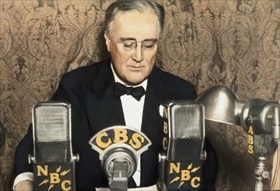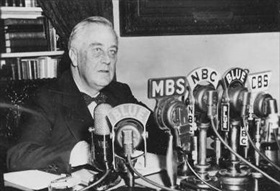ROOSEVELT: U.S. MUST PLAN FOR ITS DEFENSE
Washington, D.C. · December 20, 1940
On this date in 1940 President Franklin D. Roosevelt appointed William Knudsen to head a 4‑member board (Office of Production Management, or OPM) to plan for national defense and coordinate aid to Great Britain following Germany’s total blockade of that island nation in mid-August (Battle of the Atlantic). A Danish immigrant at the age of 20, Knudsen had worked for Ford (1911–1921) and General Motors, moving from heading the Chevrolet division to heading GM in 1937. In his long automotive career Knudsen had emerged as a skilled manager of resources and a leading expert in mass production, championing the critical role of interchangeable parts, continuous workflow and a moving assembly line for enhanced efficiency and productivity, and simplified design, among the many manufacturing practices he put into place. Roosevelt now invited Knudsen to apply his skills to help with war production.
In a fireside chat broadcast by more than 500 stations 9 days later, on December 29, Roosevelt warned Americans of impending dangers at home and abroad and appealed to citizens to support U.S. rearmament. At a time when millions of German military personnel occupied much of Europe and the Luftwaffe daily rained destruction on British cities and harbors (Blitz), we must, the president stressed, be “the great arsenal of democracy” for those fighting totalitarian dictatorships—especially for the British, who at the moment were “the spearhead of resistance to world conquest.”
Roosevelt’s address was “a call to arm and support” our European and Chinese allies in their all-out war against Nazi Germany and Imperial Japan. (Knudsen was asked to review and comment on an early draft of the address.) Such assistance, the president said, would spare Americans the agony and suffering of war that others have had to endure.
“The great arsenal of democracy” came to specifically refer to American industry and labor as the chief military supplier for the Allied war effort. Industry and labor had the power to turn the tide of the war, Roosevelt said, and in a large measure they did just that. “For us,” FDR intoned, “this is an emergency as serious as war itself. We must apply ourselves to our task with the same resolution, the same sense of urgency, the same spirit of patriotism and sacrifice as we would show were we at war.”
Steps on Becoming the “Arsenal of Democracy”
 |  |
Left: At 9:20 Sunday evening, December 29, 1940, in a room filled with Washington dignitaries and 2 Hollywood stars (Clark Gable and his wife, Carole Lombard), Roosevelt began the 16th fireside chat of his presidency. The talk would center on national security, he forewarned his listeners. The peril to the nation represented by Nazi Germany, Fascist Italy, and Imperial Japan—the principal Axis powers—was clear, he said. Standing between Axis world domination and Western democracy stood Great Britain. “If Great Britain goes down, the Axis powers will . . . be in a position to bring enormous military and naval resources against this hemisphere. . . . All the Americas would be living at the point of a gun.” Hours earlier a Luftwaffe raid on London demonstrated the pointed gun, severely damaging famous buildings and churches in the city’s center and threatening St. Paul’s Cathedral in the conflagration.
![]()
Right: President Roosevelt gave over 30 fireside chats during his presidency (1933–1945). By the end of the 1930s, events in Europe and Asia moved the focus of these radio addresses from economics to foreign affairs as FDR weighed in on the subject of American neutrality and military preparedness in the face of opposition by noninterventionist pressure groups like the 800,000-member-strong “America First Committee.” After the Japanese attack on Pearl Harbor and the overnight retreat of the isolationists (renown aviator Charles Lindbergh was their unofficial leader and spokesperson), Roosevelt’s fireside chats shifted to fighting a global war as he led the nation in “the defense of our civilization [and in] the building of a better civilization in the future”—foreshadowing his wartime role in words from his December 1940 address.
Photo Montage and Audio of President Roosevelt’s Fireside Chat on the “Arsenal of Democracy”
![]()

 History buffs, there is good news! The Daily Chronicles of World War II is now available as an ebook for $4.99 on Amazon.com. Containing a year’s worth of dated entries from this website, the ebook brings the story of this tumultuous era to life in a compelling, authoritative, and succinct manner. Featuring inventive navigation aids, the ebook enables readers to instantly move forward or backward by month and date to different dated entries. Simple and elegant! Click
History buffs, there is good news! The Daily Chronicles of World War II is now available as an ebook for $4.99 on Amazon.com. Containing a year’s worth of dated entries from this website, the ebook brings the story of this tumultuous era to life in a compelling, authoritative, and succinct manner. Featuring inventive navigation aids, the ebook enables readers to instantly move forward or backward by month and date to different dated entries. Simple and elegant! Click 











